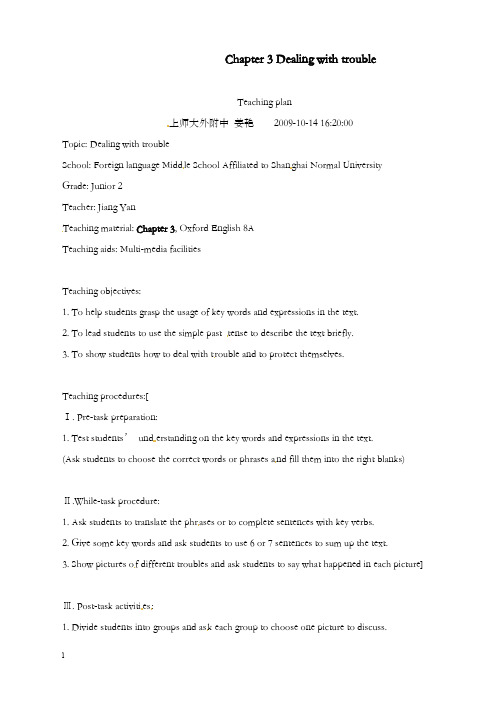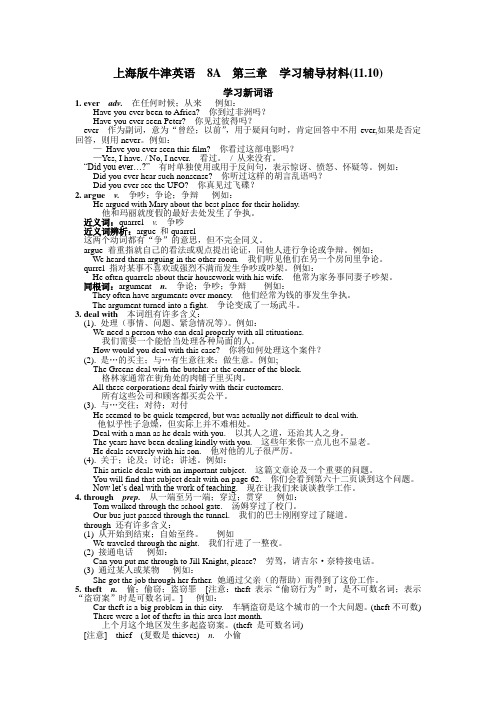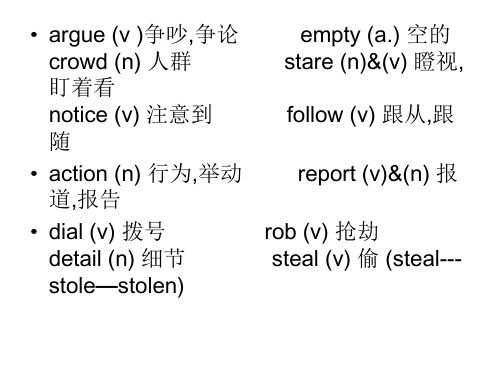阅读Dealing with trouble
新牛津上海版英语八年级上册《chapter 3 dealing with trouble》优秀教案(重点资料).doc

Chapter 3 Dealing with troubleTeaching plan上师大外附中姜艳2009-10-14 16:20:00Topic: Dealing with troubleSchool: Foreign language Midd le School Affiliated to Shan ghai Normal University Grade: Junior 2Teacher: Jiang YanTeaching material: Chapter 3, Oxford English 8ATeaching aids: Multi-media facilitiesTeaching objectives:1. To help students grasp the usage of key words and expressions in the text.2. To lead students to use the simple past tense to describe the text briefly.3. To show students how to deal with trouble and to protect themselves.Teaching procedures:[Ⅰ. Pre-task preparation:1. Test students’und erstanding on the key words and expressions in the text.(Ask students to choose the correct words or phrases a nd fill them into the right blanks)Ⅱ.While-task procedure:1. Ask students to translate the phr ases or to complete sentences with key verbs.2. Give some key words and ask students to use 6 or 7 sentences to sum up the text.3. Show pictures of different troubles and ask students to say what happened in each picture]Ⅲ. Post-task activiti es:1. Divide students into groups and as k each group to choose one picture to discuss.Topic: If you are in one of the troubles, how will you deal with it?[2. Invite students to share the trouble they met and give some suggestions.Assignment:1. Read the text fluently.2. Write a diary about a trouble you met in the past (about 60 words).。
8AU3Dealingwithtrouble阅读教学教案

Dealing with trouble(Oxford English 8A Unit 3)Students: Class 1 Grade 7, Gaoqiao-Donglu School Teacher: Yu WenruiI.Material analysisThe teaching material is about story learning. Students need to be clear about 6 ele ments of a story, find the clue of story development, and analyze the character’s q ualities so that they can cultivate the good habit of reading for information between lines and especially information after lines. Besides, they should enhance the ability of using the simple past tense.II.Class analysisThe material is for 8th graders, but I choose 7th graders to have a try. I guess my class may have difficulty in predicting especially in analyzing the character in the s tory. But I will guide them to learn to read and enjoy fun of reading.III.Teaching Objectives:1.Language objectives:By the end of this lesson, students will improve their skill of using the simple past tense to describe and express.2.Ability objectives:Students will improve reading comprehension skills by analyzing six elements of a story and finding the developing clue of a story.3.Emotion objective:Students will strengthen awareness of social responsibility-to help someone in trouble in a wise and efficient way and learn self protection as well.IV.Teaching focus and difficulty1.How to find the clue of story development2.How to analyze qualities of the character by observing detailsV.Research points1.提问激发思维碰撞2.学习方式自主合作3.教学效益得到优化C Today my dad and l were waiting for the ferry when suddenly we heard a big argument. Two women tourists and a young man were shouting at each other. The man held out a bag, and showed everyone that it was empty.A The crowd stared at the three people. No one knew what was happening.My dad moved through the crowd and said quietly to one of the women, ‘What’s going on?’‘They stole my friend’s purse,’ said the woman. ‘We were in the bookshop, buying postcards. Three young men started talking to us. Suddenly my friend noticed that he r purse was gone. Two of the men ran away. We followed this man here.’D Then the gates opened. The man hurried aboard, and the two womentourists went after him.‘Wait,’ said my dad. ’Let’s take the next ferry.’This was strange. Was my dad afraid of that man? l followed him to a shop nearby.B He picked up the phone and quickly dialed 110. ‘I want to report a theft. The man is on No. 3 Ferry now It just left a few minutes ago. Please meet the ferry.’ He gav e some more details, and then put the phone down.E We took the next ferry. As we got off, we saw the two women tourists and four policemen standing around the man and he looked worried.‘Well done, Dad,’ said as we walked by. Dad just smiled.。
牛津上海版八上Chapter3《Dealingwithtrouble》word学习辅导材料

上海版牛津英语8A 第三章学习辅导材料(11.10)学习新词语1. ever adv.在任何时候;从来例如:Have you ever been to Africa? 你到过非洲吗?Have you ever seen Peter? 你见过彼得吗?ever 作为副词,意为“曾经;以前”,用于疑问句时,肯定回答中不用ever,如果是否定回答,则用never。
例如:—Have you ever seen this film? 你看过这部电影吗?—Yes, I have. / No, I never. 看过。
/ 从来没有。
“Did you ever…?” 有时单独使用或用于反问句,表示惊讶、愤怒、怀疑等。
例如:Did you ever hear such nonsense? 你听过这样的胡言乱语吗?Did you ever see the UFO? 你真见过飞碟?2. argue v.争吵;争论;争辩例如:He argued with Mary about the best place for their holiday.他和玛丽就度假的最好去处发生了争执。
近义词:quarrel v. 争吵近义词辨析:argue 和quarrel这两个动词都有“争”的意思,但不完全同义。
argue 着重指就自己的看法或观点提出论证,同他人进行争论或争辩。
例如:We heard them arguing in the other room. 我们听见他们在另一个房间里争论。
qurrel 指对某事不喜欢或强烈不满而发生争吵或吵架。
例如:He often quarrels about their housework with his wife. 他常为家务事同妻子吵架。
同根词:argument n. 争论;争吵;争辩例如:They often have arguments over money. 他们经常为钱的事发生争执。
八年级英语Chapter Three Dealing with trouble reading上海牛

初二英语Chapter Three: Dealing with trouble: reading某某牛津版【本讲教育信息】一. 教学内容:Chapter Three: Dealing with trouble: reading[学习过程]一、重点句子:1.Today my father and I were waiting for the ferry .今天我爸爸和我正在等渡轮。
在此句中所用的时态是过去进行时,这一时态的基本结构是was/were+ v.-ing 形式。
它与一般过去时态不同。
一般过去时态用于陈述过去的事实, 而过去进行时态用于描述过去某个时间里正在发生的动作,句中常有具体的表示过去的时间点或时间段。
I was watching the World Cup Final at 7 o’clock yesterday evening.昨晚7点,我正在看世界杯决赛。
He watched the World Cup Final yesterday evening. 昨晚他看了世界杯决赛。
这一时态用于描述过去某一时刻正在发生的动作。
而现在进行时描述的是目前正在发生的动作。
I was having my breakfast then. 那时我正在吃早餐。
I’m having my breakfast now.现在我正在吃早餐。
You were sleeping then. 当时你正在睡觉。
They are sleeping now. 现在他们正在睡觉。
ait 是一个不及物动词,后接宾语时,必须用短语wait for.Please wait here. He will be back in a minute. 请等在这儿吧。
他一会儿就会回来。
We should wait for help. 我们应该等待帮忙。
Will you wait for me for a while?你等我一会好么?2. This afternoon we heard a big argument. 今天下午我们听见一场大声的争论。
dealing with trouble课件3(PPT)5-1

论.并且学习有关单词.
大~|他向我直~手。④名悬挂在细线上的能做往复运动的重锤的装置。摆的长度不变且振幅不太大时,运动的周期恒等。⑤名钟表或精密仪器上用来控制 摆动频率的机械装置。⑥〈方〉动说;谈;陈述:咱们来~~,好吗?⑦()名姓。 【摆】(擺、襬)名长袍、上衣、衬衫等的最下端部分:衣~|
Teaching Designs
report (v)&(n) 报
rob (v) 抢劫 steal (v)天,旧称百日维新。参看页〖戊戌变法〗。 【百十】数指一百左右的大概数目:~来年|~个人|~亩地。 【百世】名很多世代:流芳~。 【百事通】名万事通。 【百思不解】ī反复思索,仍然不能理解。也说百思不得其解。 【百万】数一百万,泛指数目巨大:雄兵~|~富翁。 【百闻不如一 见】ī听到一百次也不如见到一次,表示;股票知识 股票知识 ; 亲眼看到的远比听人家说的更为确切可靠。 【百无禁忌】什么都 不忌讳。 【百无聊赖】精神无所依托,感到非常无聊。 【百无一失】īī形容绝对不会出差错。 【百无一是】ī没有一点儿对的地方:不应把有缺点的同事说 得~。 【百物】名各种物品:~昂贵。 【百姓】名军人和官员以外的人:平民~。 【百业】名各种行业:~兴旺。 【百叶】〈方〉名①千张。②牛羊等反 刍类动物的胃,做食品时叫百叶。 【百叶窗】名①窗扇的一种,用许多横板条制成,横板条之间有空隙,既可以遮光挡雨,又可以通风。②机械设备中像百 叶窗的装置。 【百叶箱】名装有测量空气温度或湿度的仪器的白色木箱,四周有百叶窗。放在室外,可使仪器不受太阳直接照射的影响,又可使空气自由流 通。 【百依百顺】ī形容在一切事情上都很顺从。 【百战不殆】每次打仗都不失败(殆:危险)。 【百折不挠】无论受多少挫折都不退缩,形容意志坚强。 也说百折不回。 【百褶裙】名一种下摆较宽、折叠出许多竖褶的裙子。 【百足之虫,死而不僵】ī,原指马陆这种虫子死后仍不倒下(见于三国魏曹冏《六 代论》:“百足之虫,至死不僵,以扶之者众也。”僵:仆倒)。现用来比喻势力大的人或集团虽已失败,但其余威和影响依然存在(多含贬义)。 【伯】 见页〖大伯子〗。 【佰】数“百”的大写。 【柏】(栢)名①柏树,常绿乔木,叶子鳞片状,果实为球果。木材质地坚硬,可用来做建筑材料等。②()姓。 【柏油】名焦油沥青,是焦油蒸馏后的残余物。也泛指沥青。 【捭】〈书〉分开:~阖。 【捭阖】〈书〉动开合,指运用手段使联合或分化:纵横~|~之 术。 【摆】(擺)①动安放;排列:把东西~好|河边一字儿~开十几条渔船◇~事实,讲道理。②动显示;炫耀:~阔|~威风。③动摇动;摇摆:大摇
8A u3 Reading_Dealing with trouble教学设计

Have a brainstorm about when we will dial 110.
To arouse students’interest and lead inthe topic.
Pre-reading
1.Learn the basic elements of a diary.
5.To help students understand the development of the story.
6.To encourage students to sum up.
Post-reading
Discuss: 1. Compare what Paul’s father did with what the crowd did
2.Read para.1-3 in Part I and find out the information to complete the table.
3.Read para.4-6 in Part II, sort sentences and answer questions.
4.Scan para.7- 9 in Part III and find out the information.
2.Make predictions about the story.
1.Tohave a basic understanding of a diary.
2.Toarouse interest and imagination.
While-reading
1.Skim the story and match the general ideas with the paragraphs.
2.What can we learn from Paul’s father when we are in trouble?
8a 牛津 Chapter_3_Deal_with_troubles3

1.Preview learning plan (P35—36) 2.Rewrite Chapter3(60 words)
How ______ long _____ did she _____ stay there? ______
10、There was some orange in the cup.(变一般疑问句)
Was there _____ any _____ orange in the cup?
1、What have we learnt today? 2、Have you learnt how to deal with troubles?
argued with you…
When the pan catched fire when you were cooking…
When you saw a theห้องสมุดไป่ตู้t…
Copyright 2004-2009 版权所有 盗版必究
Deal with 对待,处理, Report a theft 举报一 宗盗窃案 涉及 On the other side of Wait for 等待 the river 在河对岸 Hold out 伸出,取出 The next ferry 下一班 渡船 Stare at 凝视,盯着看 Get off 下(车,船) Run away 逃跑 stand round 围着 Hurry aboard 匆匆忙忙 ……站立 In handcuffs 戴着手 登上甲板 铐Well done! 干 Go after sb 跟着某人 得好!
PRACTISE
改写句子: 7、Lucy did her homework at home.(改否定句)
didn’t _______ do Lucy _______ her homework at home.
dealing with trouble

Reading: Dealing with trouble
Brainstorm
a big fire
a car accident
d_i_a__l
/'daɪəl/
two thieves a theft
/θeft/
at the ferry pier
/pɪə/
Activity One: Look at the title, the introduction and find out the genre(文体).
√ B. a narrative article ( )
记叙文
C. an informational article ( )
说明文
AAccttiivvitiytyTwTwo:oL:oLookoakt tahte tห้องสมุดไป่ตู้hicetupriecitnuPreaual’nsddiaasrykasnodmaeskqsuomesetiqouness.tions.
Assignments
1. Worksheet for Unit 3. 2. Work in groups , choose one situation and role-play the text in different tones to show the personalities and feelings of the characters.
Activity Three: Read the story in three minutes and put the main ideas of the paragraphs in the correct order.
Time
Place
- 1、下载文档前请自行甄别文档内容的完整性,平台不提供额外的编辑、内容补充、找答案等附加服务。
- 2、"仅部分预览"的文档,不可在线预览部分如存在完整性等问题,可反馈申请退款(可完整预览的文档不适用该条件!)。
- 3、如文档侵犯您的权益,请联系客服反馈,我们会尽快为您处理(人工客服工作时间:9:00-18:30)。
Scanning (P2--4)
The crowd _____ stared at the three people. My father moved _______ through the crowd and _____ asked one of the women, ‘ what’s going on?’The woman said stole my friend’s purse. We were in the ‘They _____ bookshop,buying _____ postcards. Three young man started _____ talkingto us. Suddenly my friend noticed purse was gone. Two of the men _____ ran that her _____ away. We followed this man here.’
Thank you!
What did the two women tourists do after the man hurried aboard? They went after him. Why didn’t Paul’s father get on the ferry? Because he wanted to report the theft. Where did Paul’s father go to call the police? A shop nearby. What number did Paul’s dial? 110.
Dealing with trouble
the fire service
the police
an ambulance
Listening
When was the diary written?
Friday, 28 June.
Where did the story happen?
At the ferry station.
the on a few man and minutes No. 3 two Ferry ago women tourists
the man stole the woman’s purse in the bookshop.
GUESS
Make a conclusion to the story
When where who Friday, 28 June At the ferry station
F F T T F T
T
Scanning (P1)
people My dad and I What did they do? were waiting for the ferry, heard a big argument.
Two women shouted at a young man. tourists A young man shouted at two women tourists, held out a bag, showed everyone that it was empty.
How To Report A Theft
When where who
What happened
More details
about 20 years old, short black hair, a shirt with green checks, a pair of black trousers, a bag in his hand,
Who were in Paul’s diary?
Two women tourists, three young men, the crowd and his father.
Skimming
1. One afternoon my father and I were waiting for the bus. 2. We heard some people singing. 3. Two woman tourist was shouting at a young man. 4.The man held out an empty bag. 5.My father knew what was happening at first. 6.One woman told my father that three young men robbed her friend of her purse. T 7.Two of the men ran away and the other one ran to the ferry. F 8.The purse was in the man’s bag. 9.Paul dialed 110 and reported the theft to the police. F 10.The policemen got there in time and caught the thief.
1.The man with the other two men _______ talked to the women tourists in the bookshop. held 2.He ______ out an empty bag.
1.He _______ moved through the crowd. 2.He didn’t want to ______ the take ferry. 3.He hurried to a shop and ______ 110. He dialed ______ reported the theft to the policeman.
Two tourists women The young man The young man
What 1.They were in buying postcards happened _____________ the bookshop. 2.They noticed ______ that the purse was stolen. 3.They followed ______ the man to the ferry station.
